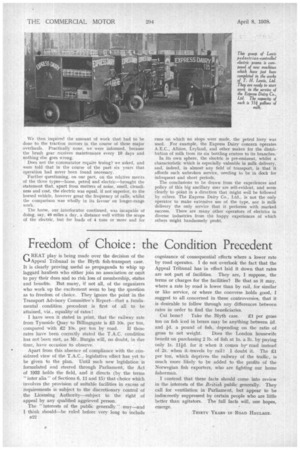Freedom of Choice: the Condition Precedent
Page 56

If you've noticed an error in this article please click here to report it so we can fix it.
GREAT play is being made over the decision of the Appeal Tribunal in the Blyth fish-transport case. It is clearly proving useful as propaganda to whip up laggard hauliers who either join no association or omit to pay their dues and so risk loss of membership, status and benefits. But many, if not all, of the organizers who work up the excitement seem to beg the question as to freedom of choice. They ignore the point in the Transport Advisory Committee's Report—that a fundamental condition precedent is first of all to be attained, vii., equality of rates!
I have seen it stated in print, that the railway rate from Tyneside Quay to Billingsgate is 23 10s. per ton, compared with £2 10s. per ton by road. If those rates have been correctly stated the T.A.C. condition has not been met, as Mr. Burgin will, no doubt, in due time, have occasion to observe.
• Apart from this absence of compliance with the considered view of the T.A.C., legislative effect has yet to be given to the plan. Until such new legislation is formulated and steered through Parliament, the Act of 1933 holds the field, and it directs (by the terms " inter alia " of Sections 6, 11 and 15) that choice which involves the provision of suitable facilities in excess of requirements is subject to the discretionary control of the Licensing Authority—subject to the right of appeal by any qualified aggrieved person.
The "interests of the public generally ". may—and I think should—be ruled before very long to include B22
cognizance of consequential effects where a lower rate by road operates. I do not overlook the fact that the Appeal Tribunal has in effect laid it down that rates are not part of facilities. They are, I suppose, the terms or charges for the facilities? Be that as it may, where a rate by road is lower than by rail, for similar or like service, or where the converse holds good, I suggest to all concerned in these controversies, that it is desirable to follow through any differences between rates in order to find the beneficiaries.
Cui bono? Take the Blyth case. £1 per gross ton on fish iced in boxes may be anything between and id. a pound of fish, depending on the ratio of gross to net weight. Does the London housewife benefit on purchasing 2 lb. of fish at 1s. a lb. by paying only is. Hid. for it when it comes by road instead of 2s. when it travels by rail? I doubt it. The £1 per ton, which deprives the railway of the traffic, is much more likely to be added to the profits of the Norwegian fish exporters, who are fighting our home fisherman.
I contend that these facts should come into review in the interests of the British public generally. They call for ventilation in Parliament, but appear to be indiscreetly suppressed by certain people who are little better than agitators. The full facts will, one hopes, emerge.
THIRTY YEARS IN ROAD HAULAGE.






















































































































